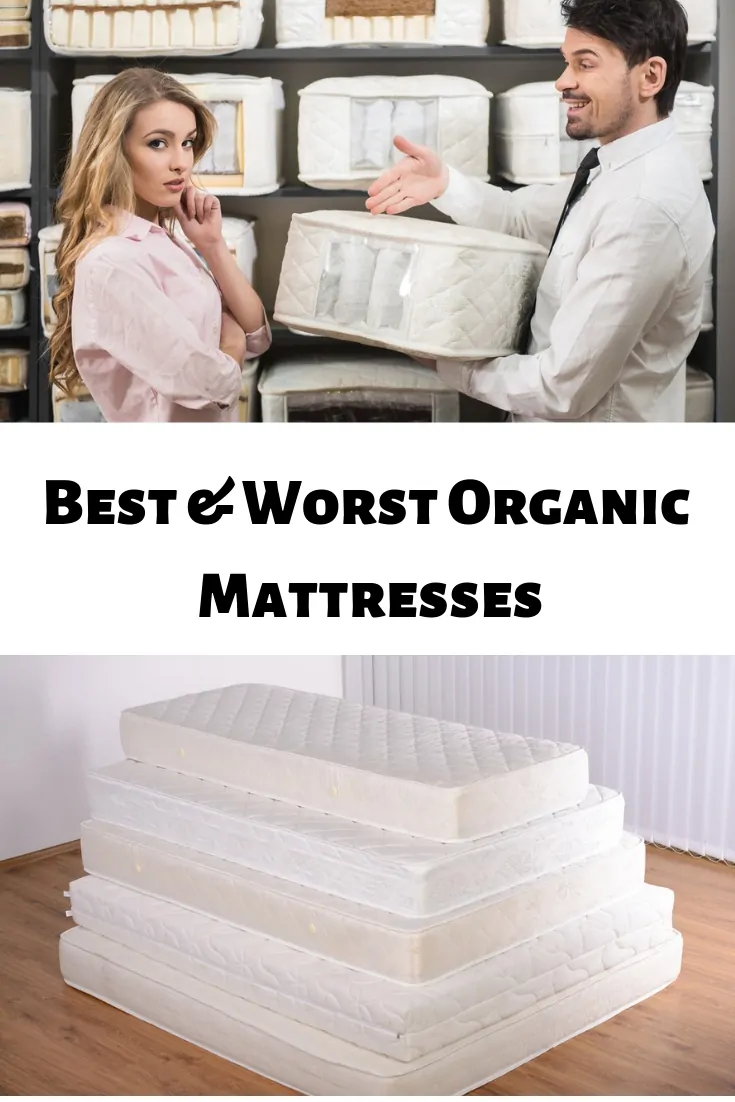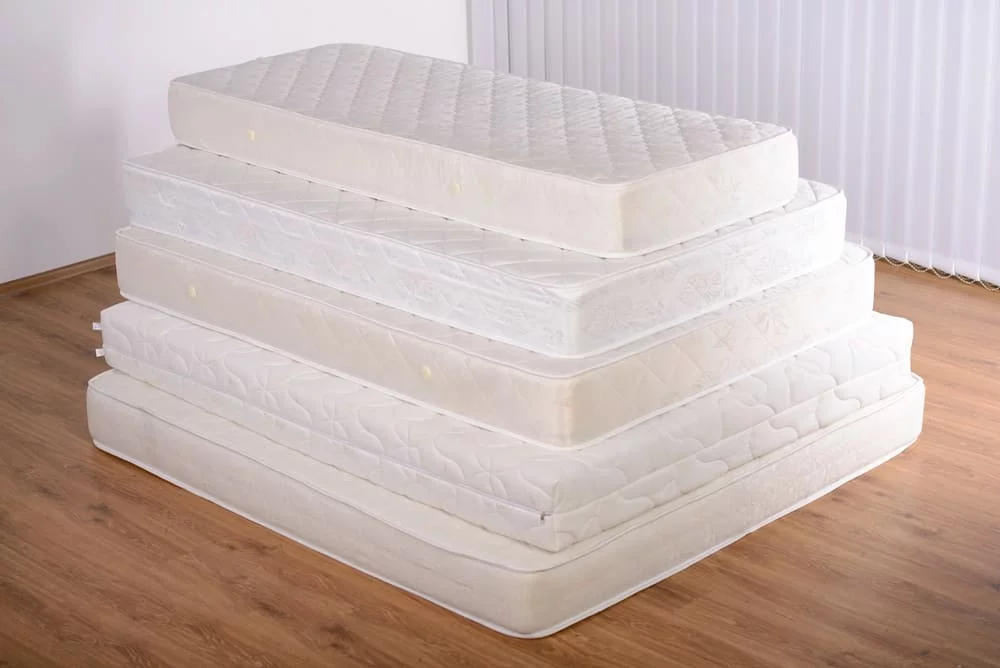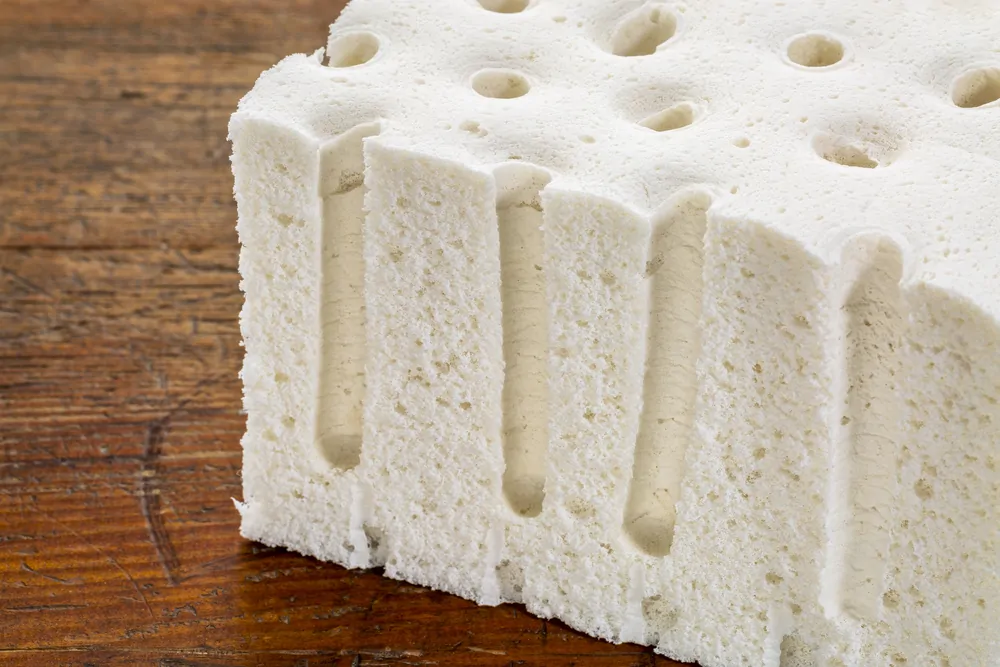It seems like every day I’m seeing a new organic mattress company pop up in my newsfeed. And now that there are so many, which are the best ones based on ingredients, trustworthiness, and certifications? This investigation wasn’t easy because the organic mattress industry is really the Wild West of marketing claims. How is an average person supposed to make sense of this? Never fear, Mamavation is here! You’ve trusted Mamavation to bring you topics like best water filters to filter PFAS “forever chemicals,” safest cookware, and the best air purifiers, now join us as we take you through the best and worst high-quality organic mattresses so your family can avoid harmful chemicals and opt for natural materials.
Disclosure: This post was medically reviewed by Sondra Strand, RN, BSN, PHN. Donations were provided by Environmental Health News and Mamavation community members. Note that Mamavation has only “spot-checked” the industry and thus we cannot make predictions about brands and products that we have not tested. Products and manufacturing aides can change without notice so buyer beware. This post contains affiliate links, with most to Amazon, which means Mamavation will receive a portion of those sales. You can also give a tax-deductible donation to our consumer studies here through Environmental Health Sciences. Thank you! Copyright © 2024 Mamavation — All Rights Reserved

Why Buy an Organic Mattress
The first thing to understand is when it comes to things like organic mattresses they live in a nebulous world with very little checks and balances regarding what they can say about their products. That ends up meaning they can basically say whatever they want. The USDA doesn’t get into the business of certifying mattresses, so the term “organic” doesn’t have a meaning. Why? Well, the USDA is really only in the business of agriculture, and anything beyond that is the wild west of nebulous marketing claims within the manufacturing processes. Are there real organic mattress companies? Yes. Who are they? We are happy to show you what we discovered in this investigation. But before we do that, let’s go through some basics.
Conventional mattresses are referred to as “100 lbs. of toxic chemicals” and that’s a great way to describe them. From petroleum-based polyurethane foam to dangerous adhesives and flame retardants, the conventional mattress industry creates a pretty toxic product. But the main reason to purchase a certified organic mattress is to protect your family from dangerous chemicals like the ones below:
- Formaldehyde–These chemical emissions are found in fabrics, adhesives, and foams. It off-gasses from the adhesives used and the petroleum-based polyurethane foam. Formaldehyde is a carcinogen.
- Flame Retardants–these chemicals off-gas for years after the mattress is sold and are harsh endocrine disruptors and possible carcinogens.
- VOCs (Volatile Organic Compounds)–Health effects range from headaches & dizziness to cancers and central nervous system problems. VOCs also bond to ozone in your home creating smog in the sunlight.
Another reason to purchase an organic mattress is that polyurethane foam is incredibly flammable. Polyurethane foam is also referred to as “gasoline” by firefighters because it’s made of petroleum and catches fire very quickly. So if you have a conventional foam mattress, fires are more of a problem. This is the reason why they have to add chemical flame retardants to the mattress to protect you. So in other words, organic mattresses will not be foam mattresses or a “memory foam mattresses.”
The video below will demonstrate what we mean by being more flammable. Here you’ll see a legacy room with materials containing cotton and wool with modern furniture made of polyurethane foam.
Organic Mattress Certifications & What They Mean
When you hear terms like “natural,” “organic,” and “sustainable,” remember these are unregulated terms. The mattress industry is like the wild wild west of marketing claims. Just because you hear the word “organic” doesn’t mean that you won’t find fire retardants, toxic adhesives, or polyurethane foam. Some brands may use polyurethane foam and toxic adhesives with organic cotton on top. So things can get confusing. But there are some certifications out there to look for that can make some of this easier. Note, these are not all the certifications you can find on a mattress, but they are the most important ones. I put these certifications in order of importance.
 GOTS Certified (Global Organic Textile Standard)
GOTS Certified (Global Organic Textile Standard)
The Global Organic Textile Standard (GOTS) certification is the golden standard of the organic mattress industry. They certify mattresses, but they also separately certify individual materials like cotton fabric made by a cotton fabric company. It mandates that the cotton or wool contents used are USDA certified. They also determine how products are processed and manufactured and what chemicals like chemical adhesives can be used during that process. And finally, they also determine what other types of materials can be used with the product that is not organic like steel coils & zippers. This certification restricts fire retardants, but not all of them.
But here’s the catch! When you see this symbol, make sure the company’s name is on the certification. We caught some companies passing off one of their supplier’s certification as their own. Not the same. That’s like turning in someone else’s work as your own.
It’s also possible some parts could be GOTS organic while the rest of the mattress are not. We found the following parts organic while other parts not: pillow-top, organic cotton cover, organic new Zealand wool, comfort layer, etc. the best organic mattresses will be entirely GOTS organic.
 Global Organic Latex Standard (GOLS) Mattress and Components Latex
Global Organic Latex Standard (GOLS) Mattress and Components Latex
The Global Organic Latex Standard (GOLS) certification is a standard for certified organic latex and finished latex foam. The standard also determines what other types of processing and materials are prohibited. The product has to maintain a minimum of 95% certified organic raw material of the total weight.
 MADE SAFE Certification
MADE SAFE Certification
MADE SAFE certifies that products are not made with cancer-causing and hormone-disrupting chemicals. The standard from this organization is one of the strictest in the marketplace. Materials in mattress products have been scrutinized by scientists and experts to ensure they do not contain harmful ingredients, off-gas dangerous vapors, or create byproducts that could impact human health.
 OCS 100 Organic Cotton Standard
OCS 100 Organic Cotton Standard
The Organic Exchange Certification Program tracks the organic material from the source to finished product. This certification gives you more piece of mind that the product contains what it says it contains. They only certify organic cotton or wool components of the mattress, not the entire thing. They act as a tracking system. This certification isn’t as strong as a certification as GOTS. A product cannot contain both GOTS and OCS 100 Organic Cotton logo on the product to protect the consumers from confusion.

 GreenGuard Gold Certification
GreenGuard Gold Certification
GreenGuard was recently acquired by Underwriter Laboratories (UL) and has changed the parameters of their standard. They no longer carry the lowest emission “Select” category and have introduced a more watered down “Gold” category instead. Green Guard is an air quality environmental testing company. They are looking into off-gassing of specific contaminants. But today they are no longer considering flame retardants, PFAS chemicals, phthalates, and microbes. This standard does test for about 350 common VOCs. We just wish they went further to get some of the worst offenders. Green Guard will certify the entire mattress or any of the components instead.

 OEKO-TEX® Standard 100 Certification
OEKO-TEX® Standard 100 Certification
The OEKO-TEX® Standard 100 Certification is a European certification that verifies textiles are free from certain harmful substances like allergenic dyes, bisphenols, heavy metals, & formaldehyde.
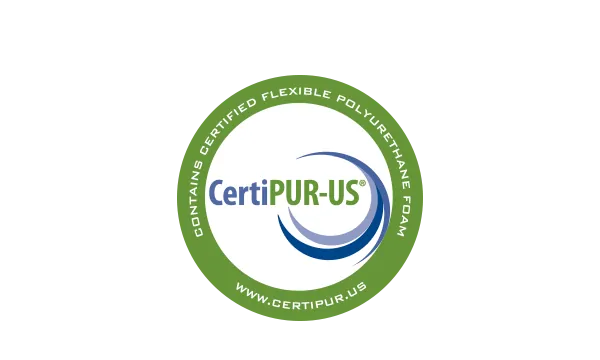
 CertiPUR-US® Certified Foam
CertiPUR-US® Certified Foam
The CertiPUR-US® name and logo are registered trademarks of the Alliance for Flexible Polyurethane Foam, Inc., a business league founded by polyurethane foam producers. They state that this certification was created by the foam industry “in close collaboration” with environmentalists, chemists, and research scientists, but any changes to the certification program can only be made with the consent of its board of directors. As of 2017, its tax filings indicate that every single member of its board is directly involved with the polyurethane foam industry. This makes it appear to be the industry creating a standard for themselves.
This certification does NOT mean that the entire mattress (or even the foam) is chemical-free, safe, non-toxic, or free of carcinogens. And polyurethane foam can never be certified organic. While this certification does ban certain substances (like CFCs) and they do conduct some testing for VOCs, the other qualifications they require might not make much of a difference at all. For example, they say that their certified mattresses are free from heavy metals and formaldehyde. However, they also admit that heavy metals or formaldehyde are rarely found in polyurethane foam in the first place. Here are their technical guidelines.
(UPDATE January 9th, 2020: We received two cease and desist letters from CertiPUR-US and adjusted copy slightly.)
Funny Business You’ll Find While Researching Organic Mattresses
During our investigation, we realized very quickly why the organic mattress industry is like the wild west of marketing claims. The amount of funny business made our heads spin. Here are some of the things we found.
Legal Claims are Nebulous
“Organic” isn’t a legal term in the organic mattress industry. Basically, anyone can call themselves organic. There are organic certifications, but they are private certifications, and the government doesn’t get involved. Because the government doesn’t get involved, there is no one policing what can be said. So buyer beware!
Companies Misuse Organic Certifications
Some companies are claiming to be GOTS or GOLS certified brands, but are not. This is important to understand. They are claiming someone else’s certification as their own. This took me some time to figure out, but once I started looking for it, I found it industry-wide. Some companies are passing off the certification of a supplier as their own. Using a portion of GOTS certified organic cotton isn’t the same thing as getting your factory GOTS certified. So that means it’s not a GOTS certified mattress. That only means that one of their suppliers is a GOTS certified producer. But why don’t they have their own certification? Getting their own certification would mean they would ALSO be restricted on other materials they used in that mattress. But with no certification, we can’t be sure what else is inside. It could be possible that 10% is from this organic supplier and 90% is something else. Certification makes all that clear. This is one of the reasons why we decided to use MADE SAFE certification as the standard for this post. That certification prevents all fire retardants from being used.
Some Companies are Still Using Fire Retardants, Polyurethane Foam & Adhesives & Being Coy About It
Some companies are using what they call “flame barriers” but not being transparent about those being made from fire retardant chemicals. In some of these accounts, the company says they don’t contain certain types of fire retardants, but doesn’t specify about ALL fire retardants in general. So in that case, what are they not telling me? In my research on online forums, I found that some companies have been known to put organic cotton covers over polyurethane foam. While other companies are saying things like they don’t use adhesives in between layers of the mattress, but never say anything about the 800+ coils they used adhesives on. These companies are being very coy about what they are NOT saying, so it’s all about what is not said. Again, this makes the MADE SAFE certification all the more important to ascertain whether they have problematic chemicals inside or not.
Why Would an Organic Company Need CertiPUR-US Certification?
We oddly found that some “organic” companies bothered to also get CertiPUR-US certification. The reason this is odd is that this certification is for companies using polyurethane foam. Wait, I thought an “organic” mattress didn’t have polyurethane foam? Hmmmm, that’s odd…
The Basics of Organic Mattresses
Latex Mattresses
All organic latex beds are a non-toxic alternative to memory foam made from natural latex sourced from rubber trees. Organic latex has great temperature regulation, good support & pressure relief for back and shoulder pain with a medium-firm feel, and has a good bounciness. They are also denser and heavier, making them more stable for heavy sleepers. But this mattress has no coils, so the bounce feels different for back sleepers, side sleepers, & stomach sleepers.
Unfortunately, things are not always what they seem in the latex mattress industry. After Avocado Mattress was sued for having synthetic chemicals inside their “natural” latex mattresses, Mamavation took a deeper dive into natural latex mattresses and latex mattress topper products you can read about here. Most brands are using natural Talalay latex or Dunlop latex.
Spring Mattress Allergenic-Free No Latex (Coils)
This is a mattress produced with coils only. About 6% of the population is allergic to latex, so having a mattress free from latex would be an important thing to have. Most brands use adhesive to attach the encased coil, which we frown upon. The best brands will heat seal the encased coils to each other. These brands will typically use certified organic wool, organic cotton fabric, & organic cotton fill.
Spring Mattress Hybrid Combination of Latex & Coils
This is the most popular selection, combining the two different attributes of squishy latex with the bounce of coils. People typically want a combination based on how soft it is and bouncy it is. Again, because this is a combo, there are more opportunities to watch out for adhesives (glues), polyurethane foam & fire retardants. The best mattresses will have organic cotton fabric, organic cotton fill, organic wool, & organic latex.
Thin Mat
These are more like a thin mattresses. It’s not very popular, but I wanted to make sure to mention it because they are kinda neat. These thin mats are typically full of wool, cotton, and/or latex and can be stiff when placed on the floor.
Mamavation Investigation of Organic Mattresses
Mamavation looked at the most popular “organic”, non-toxic & eco-friendly mattresses to organize them into simple categories based on all our research. To be in the best category several things were considered: (1) a mattress would need to come from a factory that is GOTS certified, (2) if latex is in the product, the latex needs to be GOLS certified, (3) the entire product has to be GOTS certified, (4) all the mattresses they produce are GOTS certified (or at the very least do not have sister companies producing polyurethane foam mattress) and (5) they are not misleading the public. Bonus points for lifetime warranty, a lower carbon footprint, luxury, & durability. Most brands had all sizes from California King to Twin XL.
Not Our Favorite Organic Mattress Brands
Organic claims are unclear and largely unverifiable. For example, one easy way to tell is to check to see who the certification is made out to. If it doesn’t have their name, then you know it’s not their certification but a supplier’s certification. Just because some materials were claimed to be bought from an organic supplier doesn’t mean the entire mattress is a certified organic mattress. You can very easily test this out on the GOTS website to search for brands that are certified. Another potential problem is the totality of the certifications. Just because a factory is GOTS certified, doesn’t mean that all the products that they produce are GOTS certified. Another thing we found in this category was companies only getting certified to produce mattress accessories, but not the mattress itself. In addition, companies that claim to be organic, but don’t have certification made our not favorite category. We have NO idea what claim is real or not. Without certification, we certainly can’t be certain about other problems like flame retardants, dangerous adhesives, or polyurethane foam. This is just the category where things were messy and not verifiable.
- Amerisleep
- Amore Beds
- Awara Organic
- Bear Mattress
- Bed & Wood
- Brooklyn Bedding
- Colgate
- Cozy Pure
- Custom Comfort Mattress
- EARTHSAKE
- EcoBaby Organics
- EcoChoices Natural Living Store
- EcoCloud
- Eco Terra
- FloBeds
- GOLD BOND
- Idle Sleep
- Joy Bed
- LA Baby
- Latex For Less
- Layla
- Leesa
- Loom & Leaf (By Saatva)
- Luma
- Moonlight Slumber (Moonlight Medical)
- Natural Home by The Futon Shop
- Naturalmat USA
- Nectar
- Organique
- Pure Rest Organics
- Saatva Latex Hybrid Mattress
- Sleeplily
- Soaring Heart
- Spencer’s Mattress (Churchill & Smith)
- Spindle
- Suite Sleep Inc.
- Sweet ZZZ
- The East Coast Organic Mattress Store Inc.
- Wool Bed Company
- Zenhaven (by Saatva)
Better Mattress Brands
These organic mattress companies are better. They have all their organic certifications in their names. But because the mattress industry is as nonsensical as it is, we started to look at ownership and what the factories were doing as well. This list has brands with factories that are affiliated with or also sell other non-organic products or produce other mattresses made from polyurethane foam. So in other words, they have one foot in the organic world and one foot in the conventional world making polyurethane foam.
- Avocado Green Mattress (Avocado is manufactured with Brentwood Homes which also produces mattresses made from polyurethane foam)(Black Friday/Cyber Monday sale, 10% off furniture, pillows, yoga and more, up to 50% off bedding, up to 50% off apparel. Free shipping on most items (except mattresses and furniture).
- (GOTS certified under Brooklyn Bedding and Helix which also produces mattresses made from polyurethane foam.)
- Brentwood Home (Brentwood Home is manufactured with Avocado within the same factory where they produce polyurethane foam)
- My Green Mattress (GOTS certification under a conventional mattress company called Quality Sleep Shop which also sells mattresses made with polyurethane foam) (Take 10% off products by using “mamavation” at checkout. )
- White Lotus (Check out their GOTS organic futon mattresses! Use discount code “MAMAVATION” for 20% off by using at checkout. This company also produces mattresses with a Certipur certification.)
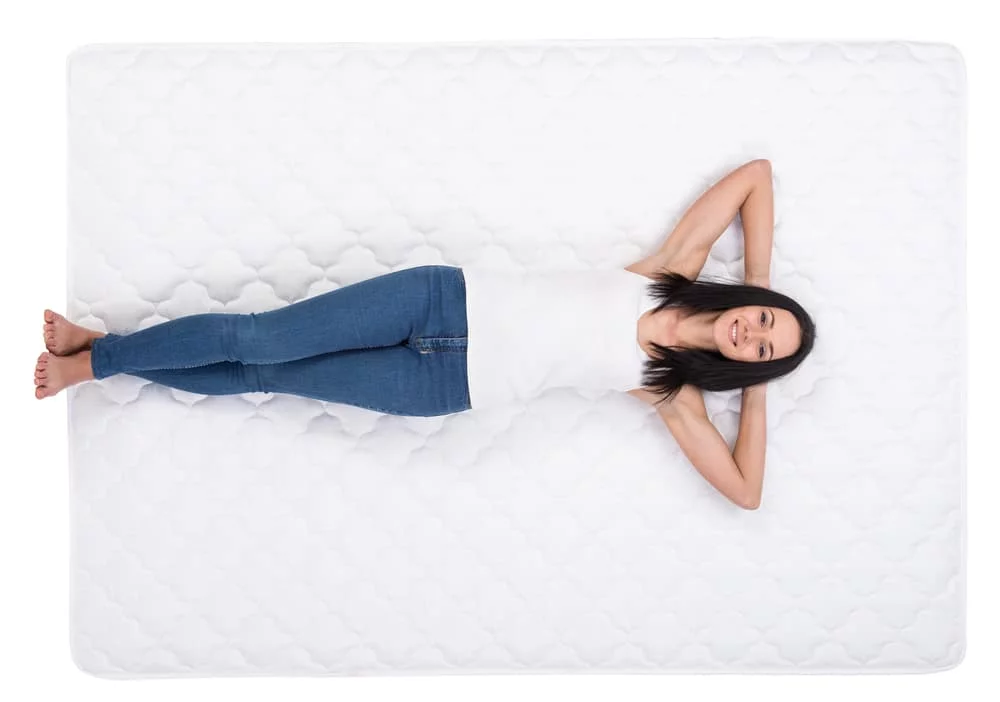
 The Best Guys
The Best Guys
Mattresses sold by these companies are GOTS-certified organic in a factory that does not also produce mattresses made from polyurethane foam. In addition, these companies meet the highest standards of nontoxicity and sustainable forestry management principles. Each certification is relevant to all the materials in the mattress. Each certification relates to the factory that produces the mattress and not just any of the suppliers. We didn’t find any funny business or claims that were outside reality.
- Happsy— (SPECIAL BLACK FRIDAY DEALS: Use discount code “BLACKFRIDAY” for 20% off + PILLOW with Mattress Purchase) (Everyday Discount for Mamavation: Use discount code “MAMAVATION10” for 10% off your total purchase. While supplies last. Cannot be used with other promo codes. Cannot be applied to past purchases. Valid one time per customer. Other restrictions may apply.)
- Naturepedic— (SPECIAL BLACK FRIDAY: Use discount code “BLACKFRIDAY” for 20% off products! Plus FREE Pillow(s) with Every Kids or Adult Organic Mattress Purchase) (Everyday Discount for Mamavation: Use discount code “MAMAVATION15” for 15% off your total purchase. While supplies last. Cannot be used with other promo codes. Cannot be applied to past purchases. Valid one time per customer. Other restrictions may apply.)
- Obasan— (Use discount code “MAMAVATIONBED” for two free complimentary pillows of your choice when you purchase an adult mattress. Make sure they are in your cart. )
